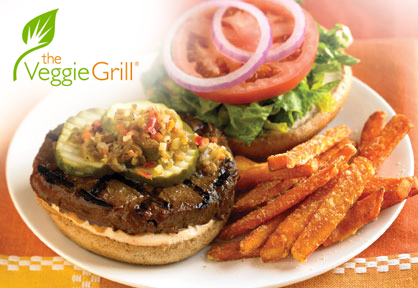Vegetarianism: Saving the world by cutting out meat
You’ve heard of vegetarianism. But do you truly understand all the different motives for going veggie? From environmental conservation to health benefits, vegetarianism is about far more than compassion for animals. This National Vegetarian Month, consider making the switch or at least cutting out a few meat-based meals a week. It will help the planet, farm animals and your health.
Saving animals often tops the list of reasons to choose a vegetarian diet, yet many are unaware of the cruelties involved in meat production. Going without meat doesn’t just prevent slaughter, it prevents brutal farming practices. Today’s farms are typically mechanized factories that treat animals abominably. Chickens, cows and pigs are jammed in small spaces, mutilated without painkillers and fed animal byproducts and hormones to grow faster. Kept in filthy, windowless cages or sheds, these animals rarely see the light of day. Yet, few laws, if any, protect farm animals from such horrifying practices.
“If it is possible to live on a vegetarian diet, then it is immoral to continue to kill creatures in order to live,” John Cunningham, consumer research manager at the Vegetarian Resource Group, said. “A vegetarian diet can open one’s eyes and encourage compassion, and we can all use a lot more compassion in our dealings with the world and with each other. (If everyone didn’t eat meat) our world would be a kinder, more compassionate place.”
Animal agriculture is devastating our environment. Meat production has been linked to wasted resources, pollution, acid rain, deforestation and more. Livestock production generates 18 percent of the world’s greenhouse gases – more than the entire international transportation system – and causes 70 percent of the Amazon rainforest destruction.
In raising crops for animal feed, much land, water and fossil fuels are wasted. Studies have shown that a meat-based diet requires up to three times as many resources as a vegetarian diet, including more than 13 times more water.
“People are concerned about the natural resources being used to support animal agriculture,” Cunningham said. “You have to use a lot of vegetable matter to feed these animals when that land could be used to feed people.”
But the reasons are not 100 percent altruistic: Meat consumption may also contribute to debilitating health disorders.
“Vegetarians are less likely than meat eaters to suffer from diabetes, heart disease and other medical conditions,” Su Taylor, press officer at The Vegetarian Society, said. “Vegetarians are also less likely to be obese and tend to have a lower average body mass index. So, although people choose to go vegetarian for many different reasons, a well-planned vegetarian diet really can make you feel better inside and out.”
In fact, Vegan Action reports that ingesting animal fats and protein has been linked to colon and lung cancer, osteoporosis, kidney disease, hypertension and several other serious conditions beyond heart disease and diabetes.
“It’s a healthy option,” Taylor said. “A balanced vegetarian diet is one of the healthiest diets around. A vegetarian diet can also be one of the cheapest ways to eat well. Whatever your reasons, going – and staying – vegetarian is a positive life choice.”
Many vegetarian choices – including vegetables, fruits and beans – are naturally low in fat, high in fiber and full of nutrients. Cunningham reports vegetarians can easily find the nutrients they need in a meat-free diet, including protein and iron.
Put simply, eating meat is just downright unnecessary.
“I never really liked the idea of eating meat, but as a child I didn’t really realize that I didn’t need or have to eat it,” Taylor said of her decision to go vegetarian. “Once I’d left home and was cooking for myself, I seemed to eat less and less meat. Then I realized that I actually didn’t need or want it, and I enjoyed food so much more.”
Making the vegetarian switch has never been easier. Meat-free choices are readily available in most mainstream restaurants and supermarkets, plus health food stores and vegetarian eateries make it even simpler to find vegetarian fare. Vegetarianism, says Taylor, is positively everywhere.
“Less than two decades ago, fruit and vegetables aside, being a vegetarian involved regular shopping trips to a specialist health food shop in search of such 'exotic' delights as kidney beans, vegetarian cheese or soya products,” Taylor said. “When eating out, vegetarians often had to settle for an uninspiring omelet, something or other involving cheese, or a limp salad of some description. Even being vegetarian was perhaps to invite ridicule. … Today, the words 'suitable for vegetarians' have become imprinted on the national conscience. They are an everyday sight on thousands of products in shops and supermarkets and on restaurant, café and pub menus all over the country.”
With so many different arguments for the lifestyle, it is no surprise that vegetarianism has attracted a motley crew of millions around the globe.
While the term “vegetarianism” means different things to different people, a Vegetarian Resource Group poll found that 3 percent of Americans (about 7 million) never eat meat, poultry or seafood.
The times are a-changing. “Vegetarianism has been on a steady but gradual increase. Two point five percent of people were vegetarian in 2001 and in 1994, 1 percent,” Cunningham said. “It’s been a pretty dramatic increase over the last ten years. Vegetarianism seems to be entering the mainstream more and more.”
A Vegetarian Times study found similar results, estimating that another 22.8 million people choose a vegetarian-inclined diet. According to the Vegetarian Resource Group, 25 to 50 percent of people choose a vegetarian option when eating out. This adds up to some serious veggie power, and supermarkets and restaurants are taking notice.
One such restaurant to join the trend is Veggie Grill, a vegetarian comfort food restaurant with seven locations in Los Angeles, Santa Monica, Irvine and other Southern California cities.
“We started the Veggie Grill based on our passion for, one, the need for delicious, wholesome, convenient food, and two, the opportunity to show people how savory and hearty this food can be,” said T.K. Pillan, co-founder of the Veggie Grill. “We make a difference by breaking people's traditional stereotypes about vegetarian food and providing them with delicious, wholesome comfort food. If you're skeptical about vegetarian food, just give us a try. You'll be amazed!”
You don’t have to go cold turkey, and you don’t have to cut out meat entirely. Find the eating style that is right for you. Every meal can make a small difference. Check out the variety of resources available on the Internet (recipes, tips, nutrtion information and statistics), including the sources below.
Sources: PETA; Vegetarian Resource Group; The Vegetarian Society; Vegan Action
Try this yummy vegetarian recipe courtesy of the Veggie Grill.

via The Veggie Grill
Grilling Glaze by Chief Foodie Ray White
Ingredients:
1 cup low-sodium tamari
1 tablespoon hot sauce (Cholula brand is recommended)
1 teaspoon ground black pepper
1 tablespoon agave nectar
½ cup pineapple juice
1 tablespoon apricot jam
1 teaspoon liquid smoke
Method:
1. Combine all ingredients in a medium-sized saucepan.
2. Heat over low heat; bring mixture to a simmer. Simmer for 10 minutes. Whisk to thoroughly combine all liquids.
3. Remove from heat. Store in a covered container; refrigerate until ready to use.
Usage:
1. As a glaze on cooked (grilled, baked, fried, sautéed, stir-fried) vegetables, veggie-proteins / faux-meats. Brush or spoon glaze on while still hot to add flavor, color and a nice shine.
Tagged in: lux exclusives, health, philanthropy, vegetarian, environment, animals, national vegetarian month, vegetarianism,

LadyLUX via istock



